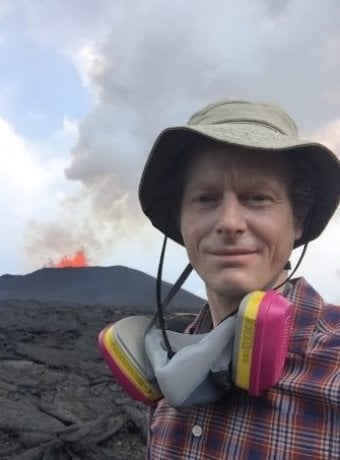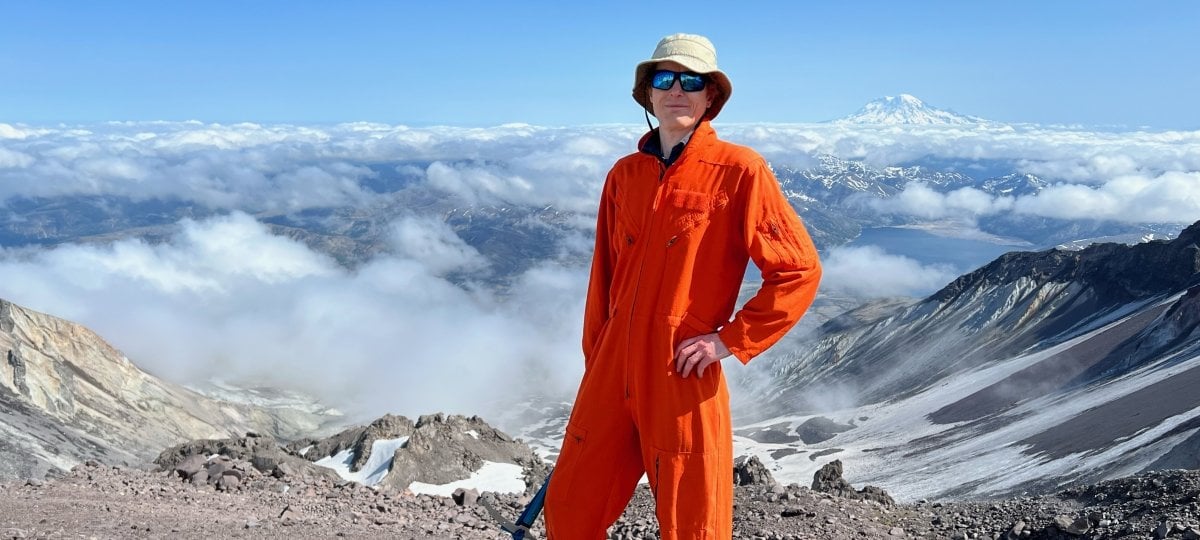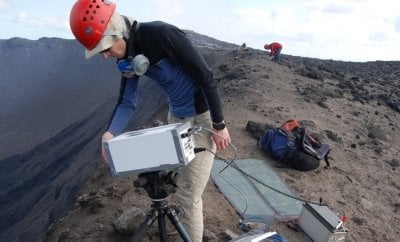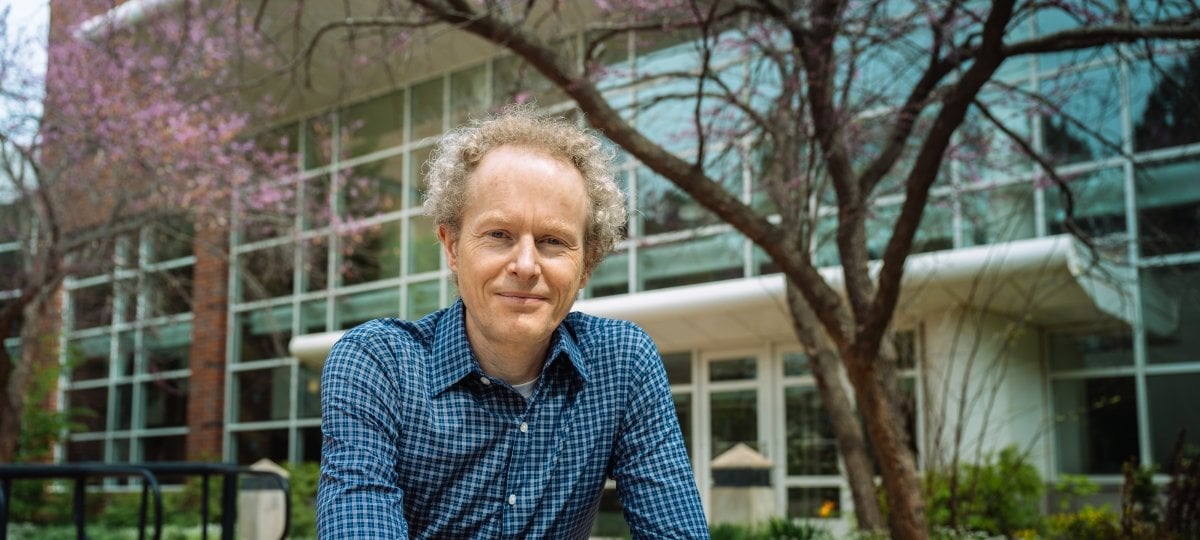Simon Carn, a world authority on satellite-powered analysis of global volcanic activity, is the winner of the 2024 Michigan Technological University Research Award.
Carn has scaled many mountains during his career — it's his love for climbing, hiking and travel that led him to study geology.
"Geology provided a pathway to a deeper understanding of landscape formation and evolution," said Carn, a distinguished professor in the Michigan Tech College of Engineering's Department of Geological and Mining Engineering and Sciences (GMES).
About the Award
The annual Michigan Tech Research Award sets a high bar for outstanding achievement in sustained research or a single noteworthy breakthrough. Nominations open each spring. The winner receives a plaque and a $2,500 cash award.
"Volcanology was an added attraction due to its focus on dynamic, visually spectacular processes that can have significant impacts on climate, the environment and human health. I also enjoy the interdisciplinary nature of volcanology, which integrates aspects of diverse subjects including geology, physics, chemistry, math, atmospheric science, data science, social sciences, and even history and the arts, among others."
Carn has to date generated approximately $15 million in research grants as a principal or co-investigator. He has received funding support from agencies at the apex of exploration and discovery, including NASA, the National Science Foundation (NSF) and the U.S. Geological Survey (USGS).
He is a member of several professional and technical societies, including the American Geophysical Union, the American Meteorological Society, and the International Association of Volcanology and Chemistry of the Earth's Interior (IAVCEI). Carn's teaching experiences span the globe, from his volcanology course at Michigan Tech, where he arrived in 2008, to a recent workshop on remote sensing for volcano monitoring at an IAVCEI Scientific Assembly in Rotorua, New Zealand.
At Michigan Tech, Carn has mentored four postdoctoral associates, 22 Ph.D. students — serving as primary or co-advisor to nine — and 37 master's degree students, serving as primary or co-advisor to 18.
"He is one of a very few scientists I would trust to be at my side during a volcanic crisis."
In his letter of support for the Research Award nomination, John S. Pallister said it's no wonder that students seek Carn out as an advisor. Pallister, emeritus scientist with the U.S. Department of the Interior's USGS Cascades Volcano Observatory and former chief of the Volcano Disaster Assistance Program, said he points prospective graduate students in Carn's direction when they seek a recommendation.
"MTU is typically at the top of my list, largely because Dr. Carn is there," he said. "Although best known for his work on volcanic gas emissions, he also has a strong background in physical volcanology and magmatic processes."
Praising his public outreach and contributions, Pallister said many others in the field of volcanology have learned to turn to Carn.
About the Researcher
"Put simply, Simon Carn is well-known in the community of volcano observatories as both a world-class volcanologist and a trusted advisor. His soft-spoken manner, coupled with extensive knowledge, experience and a sensitivity to local customs makes him a valued partner, as is evident from his work during periods of unrest and eruption at volcanoes in the West Indies, Latin America, Iceland, Africa and Indonesia," he said.
Demonstrating a long-term commitment to sharing his work with fellow scientists and a broader audience, Carn is a regular contributor to NASA's Earth Observatory educational website, and his expertise has been shared in Scientific American and National Geographic. One of Tech's most oft-quoted experts, he's been interviewed numerous times for TV, radio and newspapers, including BBC World Service, The Weather Channel, The Wall Street Journal and Weather Underground. Carn also shares real-time reports related to volcano activity on X, the social media channel formerly known as Twitter.
In a letter of support for Carn's award nomination, David Pyle, Carn's doctoral advisor at the University of Cambridge, said he's kept up with Carn's "prodigious outputs, both in academic journals, and his social media updates on emerging volcanic events." He described how Carn's Ph.D. work began on the island of Java, where Carn "covered hundreds of square miles to document the dozens of volcanic craters, cones and maars of the previously poorly known Lamongan Volcanic Field and learned to speak Bahasa Indonesia."
Pyle said Carn's work took off in its trailblazing direction based on a parallel project during that time. Carn investigated how freely available satellite imagery could be analyzed to conduct remote monitoring of Indonesia's volcanoes. The paper he wrote on the topic showed the internet's potential as a data source and effective tool for large-scale volcano surveillance and monitoring.
"This concept seems commonplace today, but Simon was ahead of the curve, and his paper won the European 'Len Curtis award' for the best paper in remote sensing literature in 2000," said Pyle. "This defined the trajectory of Simon's future career. While some of his earlier papers in this area were event-driven and others were important technical contributions, his lasting and continuing contribution has been the assembly and analysis of long-term datasets of global volcanic sulfur dioxide emissions."
"We now know the global annual-to-decadal variability of sulfur dioxide emissions from explosive volcanic eruptions, and we have Simon Carn to thank for this."
Carn finished his postdoctoral work on the Caribbean Island of Montserrat, where he monitored the active Soufriere Hills volcano, and went on to NASA's Goddard Space Flight Center, where he continued to use satellite data to monitor volcanic emissions.
Carn's dataset, which extends from the start of the satellite era (circa 1979) to the present day, spans generations of instruments and many hundreds of events, said Pyle.
In addition to receiving this year's Research Award, Carn was also recognized as a 2024 University Professor, which acknowledges substantial contributions by faculty to Michigan Tech and their discipline.
Q&A with Simon Carn
In his own words, the 2024 Research Award winner reflects on his research, the role he and Michigan Tech play in the worldwide volcanology community, and why people are — and should be — interested in volcanoes.
Q: Say you're in a cafe or some other place where people strike up conversations. How do you describe your work? What are people most likely to ask you?

SC: I'm lucky to work in a field that is not too esoteric — I think most people have at least a basic understanding of the significance of volcanoes and the importance of studying them. If you tell people you're a volcanologist, the most likely question is if we can predict volcanic eruptions, and/or when the next large eruption will occur. Although the overarching goal of all volcano science is to improve understanding of volcanoes and provide better forecasts of volcanic activity and eruptions, most individual volcanologists like me are only working on a small piece of the whole puzzle.
Q: You've been highly rated by the GMES students and faculty for your ability to teach complex topics effectively and efficiently to students with a wide range of learning abilities and backgrounds. Your student evaluations are consistently strong. What's your secret? Tell us about your approach to teaching.
SC: As a scientist and educator, I've always strived to break down any complex topic or concept to its underlying, fundamental principles. I think this is the only way to achieve the deep understanding required for effective teaching of any subject. Of course, the sciences we teach are constantly advancing but, in some ways, I think it's more important to focus on understanding the fundamentals rather than the cutting edge. I always try to read widely on any subject and encourage students to do so, as I think differing viewpoints and approaches illuminate any topic and promote deeper understanding.
Q: You're also known as being highly collaborative. Tell me about your world community and how and whom you interact with.
SC: My work with satellite remote sensing data provides a global perspective on volcanic activity, and over the years this has presented opportunities to collaborate with volcanologists in many countries including Indonesia, Papua New Guinea, Chile, Colombia, Costa Rica, Russia, Vanuatu and the Democratic Republic of Congo. Often, they are seeking assistance with volcano monitoring using satellite data that may not be easy for them to access, process or interpret.
In addition to my strong connections with NASA, I have a long-term collaboration with colleagues at the U.S. Geological Survey (USGS) Volcano Disaster Assistance Program (VDAP) in Vancouver, Washington, who respond to volcanic crises worldwide and sometimes need outside expertise in satellite data analysis. Satellite measurements of volcanic gases have greatly improved in recent years, and now play a critical role in the response to any volcanic activity.
In general, understanding volcano behavior and finding solutions to volcano science problems requires a multipronged approach and analysis of multiple datasets, so the field is naturally very collaborative. The volcano science community is also relatively small and close-knit compared to some other fields, which makes collaboration easier. Plus, there are relatively few persistently active, accessible or 'laboratory' volcanoes available for studies of active volcanic processes — Kilauea in Hawaii and Stromboli in Italy are good examples — and so volcanologists tend to congregate in these locations for fieldwork.
Q: Why do you care about your research? What do you find most exciting or important about it?
SC: Understanding the impacts of volcanic activity on our atmosphere and climate has never been more relevant, as humanity faces the consequences of ongoing climate change and global warming due to anthropogenic greenhouse gas emissions.
A single, major volcanic eruption in the future could initiate a few years of cooling, temporarily offsetting global warming. Attempting to identify the warning signs that might herald such an event and the possibility of capturing it if — or when — it happens, is one of the most exciting aspects of my research. But aside from these infrequent, larger events, volcanic activity has some impact on humans and the environment on a daily basis somewhere in the world and my research plays an important role in understanding and mitigating these effects.
"We're still a long way from being able to provide an accurate, long-range forecast of the next major eruption. But my work on volcanic gas emissions contributes both to the detection of eruption precursors, which potentially allow us to improve eruption forecasting, and to our understanding of the impacts of volcanic eruptions on the atmosphere and climate."
Q: Why should we care about your research?
SC: Our research on volcanic emissions at Michigan Tech is quite distinctive — there are arguably no other groups anywhere in the world compiling the same data at the same level of detail and we have a strong reputation in the field. Plus, the data we generate are critical to our understanding of the present state of our atmosphere and climate change, so it is important and necessary work. Climate change, and our response to it as a society, has become one of the major polarizing issues of our time, and volcanoes are often incorrectly blamed for rising levels of carbon dioxide in our atmosphere, or other atmospheric impacts. Hence it is vitally important that we maintain accurate accounting of global volcanic emissions to dispel such notions.
Geoengineering, one of the proposed solutions to global warming, involves human interventions to modify climate such as the injection of sulfur gases into the stratosphere to mimic the cooling effects of large volcanic eruptions. To assess the potential efficacy of such efforts we need a detailed understanding of the impacts of volcanic eruptions.
Q: Tell us about some of your most memorable fieldwork experiences.
SC: Fieldwork on active volcanoes is always memorable in some way — the sights, sounds and smells make it a multisensory experience. I've always enjoyed climbing hills and mountains; climbing a volcano provides a similar thrill. But in addition to the view from the top, there is usually a bonus of a potential surprise at the summit, such as a cavernous crater or even an active lava lake. Some of my most memorable field missions have been to volcanoes hosting the world's largest active lava lakes, especially Nyiragongo (Democratic Republic of Congo) and Ambrym (Vanuatu). I've spent quite a few days camped at the summit of these volcanoes, measuring the volcanic gases, but the nights are the most unforgettable aspect — the constant roar of the churning lava and the orange glow illuminating the night sky like a giant searchlight make it an otherworldly experience. On one trip to Nyiragongo, we needed a supply of liquid nitrogen to cool the instrument we were using to measure the volcanic gases, but unfortunately the large dewar containing the liquid got damaged before we started the climb up to the summit crater, and the liquid nitrogen began to rapidly boil off. So, we had to race up the volcano before all the liquid nitrogen had evaporated — luckily, we were still able to make some measurements.

Q: What does your research look like on a daily basis? How is your research field evolving?
SC: On any given day, there might be a new volcanic eruption or other volcanic activity to analyze using various types of satellite data. I'm involved with several NASA satellite missions and so there is always plenty of data to evaluate. In the event of a significant volcanic eruption, I try to provide a rapid, accurate assessment (usually via social media) of any potential climate or other impacts, as there tends to be rampant misinformation and exaggeration of the effects after most large eruptions. Otherwise, there is always a huge amount of archived data to analyze, code to write, or new research papers to read.
In the past few years there have been some exciting new developments in satellite observations, allowing us to study volcanic activity with higher temporal resolution. As in many other fields, machine learning and artificial intelligence (AI) are likely to play an increasingly significant role in volcano science in the future as the volume of satellite and other data to process and interpret grows exponentially. The ongoing, rapid development of AI is simultaneously exciting and a little concerning. In volcanology, I think AI has great potential for tasks such as pattern recognition in complex data, but at the same time I worry that there is still a wealth of human experience of volcanoes and intuition that is yet to be captured in the datasets used to train AI tools.
Q: Why did you come to Michigan Tech?
SC: Michigan Tech has long been known as one of the few institutions specializing in volcanology in the U.S., since Professor Bill Rose, now emeritus, started the program here in the 1970s. It is also particularly recognized for expertise in satellite remote sensing of volcanoes, which I worked on during my postdoc at NASA and the University of Maryland. So, when I was finishing up my postdoc and looking for tenure-track academic positions, Tech was naturally very high on my list. After living for several years on the East Coast near Washington, D.C., I was also attracted to the benefits of small-town life, such as relatively low cost of living, short commutes, clean air and easy access to outdoor recreation.
Q: Why do you think people are so fascinated by volcanoes?
SC: Volcanic activity can certainly be awe-inspiring to watch, and I think our fascination with volcanoes runs deep in the human psyche. When you watch an active or erupting volcano you are looking at a phenomenon that has been acting essentially unchanged for millions of years of Earth history.

In recent years, we are lucky to have had access to a proliferation of webcams providing real-time views of eruptions in places like Iceland, Hawaii and the Canary Islands, which are very popular.
Volcanoes provide a glimpse of the primordial processes that have shaped the Earth throughout deep time, and observing them can be a visceral, even humbling experience, which I think has few parallels in the modern world. As our daily lives become increasingly dominated by technology and detached from the natural world, such experiences are becoming more valuable.
Q: What do volcanoes have to teach us?
SC: Volcanoes represent forces that are beyond our capacity to control, and an important reminder that we inhabit a planet that is geologically active on timescales vastly removed from our own, fleeting human experience. They teach us to think about 'deep time,' to acknowledge human fallibility, and to apply our innate creativity to imagine processes acting within the Earth that will never be directly observable. I think this has ramifications for our approaches to major contemporary issues, such as climate change, which has both natural and anthropogenic components. We must respect the natural cycles of the Earth and its atmosphere and take care not to disrupt them.
Q: On a lighter note, what do you like to do in your free time?
SC: In the winter I enjoy cross-country skiing or snowshoe running on our local trails. We're lucky to have some world-class groomed trails next to campus and elsewhere in the region that provide ample opportunities for outdoor recreation in the winter months (i.e., about half the year in the Upper Peninsula!). When the snow melts, I switch to trail running or mountain biking on the same trails. It's well known that spending time in nature can improve mental health and having easy access to the peace and tranquility of the Northwoods is a big attraction of living here.
Michigan Technological University is an R1 public research university founded in 1885 in Houghton, and is home to nearly 7,500 students from more than 60 countries around the world. Consistently ranked among the best universities in the country for return on investment, Michigan's flagship technological university offers more than 185 undergraduate and graduate degree programs in science and technology, engineering, computing, forestry, business, health professions, humanities, mathematics, social sciences, and the arts. The rural campus is situated just miles from Lake Superior in Michigan's Upper Peninsula, offering year-round opportunities for outdoor adventure.







Comments